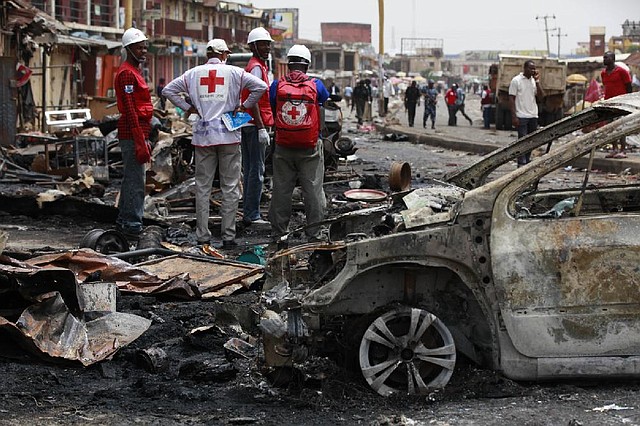48 slain in three Nigerian villages
U.S. sends 80 troops to Chad in hunt for abducted schoolgirls
Red Cross workers on Wednesday search the site where a car bomb went off Tuesday in Jos, Nigeria, one of two bombings that day that left 130 people dead.
Thursday, May 22, 2014
JOS, Nigeria -- Boko Haram assaulted three villages in northern Nigeria, killing 48 people, residents said Wednesday, hours after twin bombings claimed at least 130 lives in Jos in an attack the government blamed on the Islamic extremists.
One of the villages attacked between Tuesday night and early Wednesday is near the town of Chibok, where more than 300 schoolgirls were kidnapped last month by Boko Haram, according to residents and a state intelligence agent who spoke on condition of anonymity.
The United States has deployed 80 military personnel to Chad to help locate the girls, President Barack Obama said Wednesday.
Obama, in a letter to House Speaker John Boehner and the Senate, said the service members will help with intelligence, surveillance and reconnaissance aircraft for missions over northern Nigeria and the nearby region. He said the force will stay in Chad until its support is no longer necessary.
According to Lt. Col. Myles Caggins, the U.S. military personnel will help expand drone searches of the region. About 40 of the troops will make up the launch and recovery teams for a new drone, a Predator, and the other 40 will make up the security force for the team. Caggins said the latest deployment will not involve ground searches by the troops.
In Nigeria, Apagu Maidaga of Alagarno said residents of the village near Chibok hid in the bush and watched while the extremists set ablaze their thatch-roofed mud huts.
"We saw our village up in flames as we hid in the bush waiting for the dawn," he said. "We lost everything."
In Jos, where at least 130 people were killed in twin bomb attacks Tuesday on a bustling bus terminal and a market, residents Wednesday joined rescue workers armed with body bags in looking for missing loved ones.
Officials reported an additional 12 deaths from the blasts: Seven mutiliated bodies were recovered from the scene and five of the wounded died in the hospital.
Most victims were female and child vendors, said Mohammed Abdulsalam of the National Emergency Management Agency.
Boko Haram, the group suspected in the attack, wants to impose an Islamic state under strict Shariah law in Nigeria, though half the country's 170 million people are Christians.
Nigeria's United Nations envoy on Wednesday said she expects the Security Council to declare Boko Haram a terrorist group and impose sanctions on the al-Qaida-linked extremists.
"I don't think there will be any objections," Ambassador U. Joy Ogwu told several reporters.
Nigeria, which is serving a two-year term on the council, asked the committee monitoring sanctions against al-Qaida to add Boko Haram to the list of organizations subject to an arms embargo and asset freeze. Unless any of the 14 other council member object by a deadline set for this afternoon, Boko Haram will be added to the al-Qaida sanctions list.
At the Jos marketplace, earthmovers demolished buildings weakened by the bomb blasts and fires and moved heavy debris, allowing rescuers to search for more bodies.
Gloria Paul was among a handful of people searching for loved ones at Bingham University Teaching Hospital. She was looking for her husband, but all she had found so far was his car parked near Terminus Market, its windows shattered.
President Goodluck Jonathan tried to assure Nigerians their government "remains fully committed to winning the war against terror."
Nigerian army spokesman Brig. Gen. Olajide Laleye also insisted victory was close Wednesday, dismissing reports of troops suffering from low morale and lack of basic equipment, including bullet-resistant vests.
"I make bold to say that the Nigerian army is steadily and surely reversing the ugly menace of terrorism and insurgency in the northeast part of this great nation," he said at an army recruiting campaign.
However, extremist attacks have increased in frequency and deadliness this year, with more than 2,000 killed in the insurgency compared with an estimated 3,600 between 2010 and 2013.
On Monday, a car bomb at a bus station killed 24 people in the Christian quarter of the northern Muslim city of Kano, where police later defused another large car bomb. Two bomb blasts in April around another bus station, in the nation's capital, Abuja, killed more than 120 people and wounded more than 200.
The attacks on Monday and Tuesday took place after regional and Western leaders pledged "total war" on the militant group at a weekend summit in Paris.
The U.S. Embassy in Abuja condemned Tuesday's attack and said the United States is helping Nigeria to "grapple with violent extremism," while also urging calm in Jos.
Information for this article was contributed by Sunday Alamba, Haruna Umar, Jim Kuhnhenn, Lolita C. Baldor and Bashir Adigun of The Associated Press.
A Section on 05/22/2014

